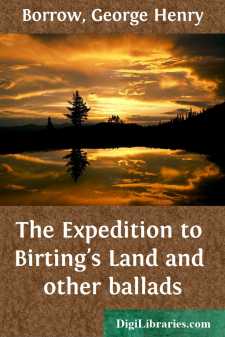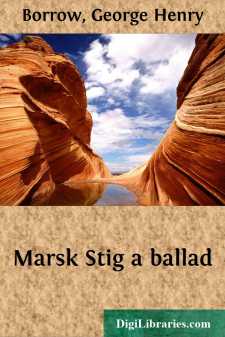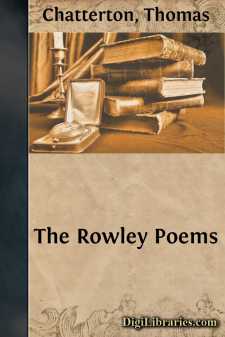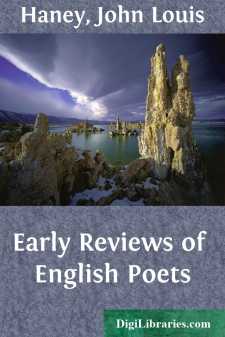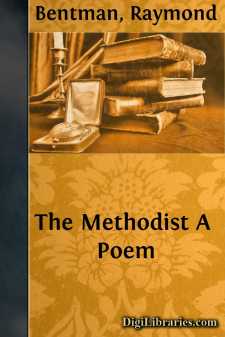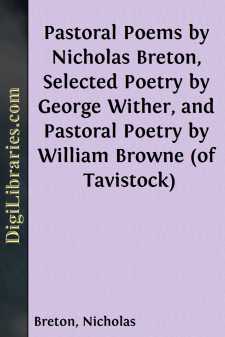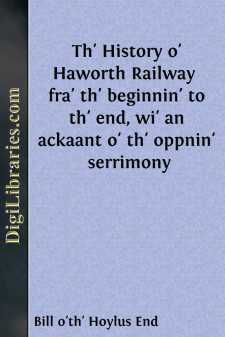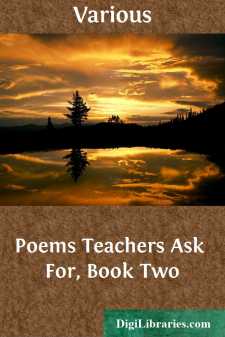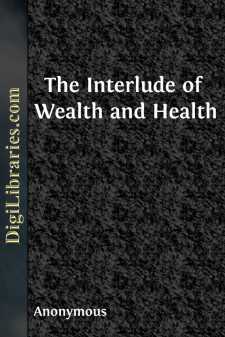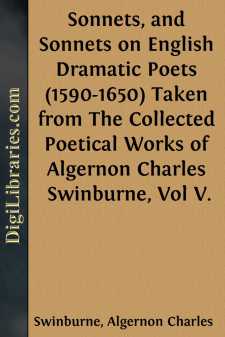Poetry
- American 96
- Ancient, Classical & Medieval 41
- Asian 15
- Australian & Oceanian 11
- Canadian 11
- Caribbean & Latin American 5
- Children's Poetry & Nursery rhymes 51
- Continental European 11
- English, Irish, Scottish, Welsh
- General 483
- Inspirational & Religious 7
- Middle Eastern 3
English, Irish, Scottish, Welsh Books
Sort by:
THE EXPEDITION TO BIRTING’S LAND The King he o’er the castle rules, He rules o’er all the land;O’er many a hardy hero too, With naked sword in hand. Let the courtier govern his steed, The boor his thatchèd cot,But Denmark’s King o’er castles rules, For nobler is his lot. King Diderik sits on Brattingsborg, And round he looks with pride:“No one I know of in the...
more...
PART I. Marsk Stig he out of the country rode To win him fame with his good bright sword;At home meantide the King will bide In hope to lure his heart’s ador’d. The King sends word to the Marshal Stig That he to the fields of war should fare;Himself will deign at home to remain And take the charge of his Lady fair. In came the Marshal’s serving man, And a kirtle of green that...
more...
II. THE VALUE OF ROWLEY'S POEMS—PHILOLOGICAL AND LITERARY As imitations of fifteenth-century composition it must be confessed the Rowley poems have very little value. Of Chatterton's method of antiquating something has already been said. He made himself an antique lexicon out of the glossary to Speght's Chaucer, and such words as were marked with a capital O, standing for...
more...
by:
John Louis Haney
INTRODUCTION To the modern reader, with an abundance of periodicals of all sorts and upon all subjects at hand, it seems hardly possible that this wealth of ephemeral literature was virtually developed within the past two centuries. It offers such a rational means for the dissemination of the latest scientific and literary news that the mind undeceived by facts would naturally place the origin of the...
more...
by:
Raymond Bentman
INTRODUCTION Evan Lloyd’s works consist chiefly of four satires written in 1766 and 1767, all of which are now little-known. What little notice he receives today results from his friendship with John Wilkes and David Garrick and from one satire, The Methodist, which is usually included in surveys of anti-Methodist literature. For the most part, his obscurity is deserved. In The Methodist, however, he...
more...
by:
Nicholas Breton
There are few issues attended with greater uncertainty than the fate of a poet, and of the three represented herein it may be said that they survive but tardily in public interest. Such a state of things, in spite of all pleading, is quite beyond reason; hence the purport of this small Anthology is at once obvious. A group of poets graced with rarest charm and linked together by several and varied...
more...
CHAPTER I. Before I commence mi short history o’ Haworth Railway, it might be as weel to say a word or two abaat Haworth itseln. It’s a city at’s little nawn, if onny, in th’ history o’ Ingland, tho thare’s no daat but it’s as oud as Methuslam, if net ouder, yet wi’ being built so far aat o’ th’ latitude o’ civilised nashuns, nobody’s scarcely nawn owt abaat it wal lately. ...
more...
by:
Various
PREFACE In homely phrase, this is a sort of "second helping" of a dish that has pleased the taste of thousands. Our first collection of Poems Teachers Ask For was the response to a demand for such a book, and this present volume is the response to a demand for "more." In Book One it was impracticable to use all of the many poems entitled to inclusion on the basis of their being desired....
more...
by:
Anonymous
¶ Here entreth Welth, and Helth Ðâ¦ÐÑynging togethera balet of two partes, and after Ðâ¦ÐÑpeakethWelth. Why is there no curteÐâ¦ÐÑy, now I am comeI tcowe that all the people be dumeOr els Ðâ¦ÐÑo god helpe me and halydumThey were almost a fleepe.No wordes I harde, nor yet no talkingNo inÐâ¦ÐÑtrument went nor ballattes...
more...
HOPE AND FEARBeneath the shadow of dawn's aerial cope,With eyes enkindled as the sun's own sphere,Hope from the front of youth in godlike cheerLooks Godward, past the shades where blind men gropeRound the dark door that prayers nor dreams can ope,And makes for joy the very darkness dearThat gives her wide wings play; nor dreams that fearAt noon may rise and pierce the heart of hope.Then, when...
more...


